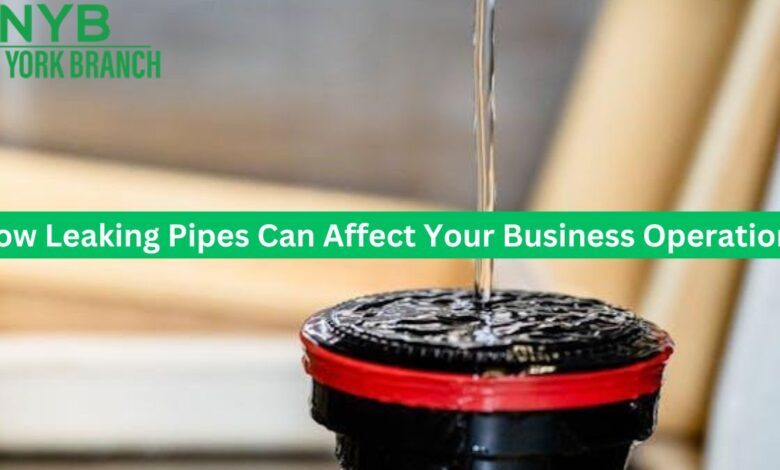How Leaking Pipes Can Affect Your Business Operations

Leaking pipes might seem like a minor inconvenience, but for businesses, they can quickly escalate into major disruptions. Unchecked leaks can have serious consequences, ranging from monetary losses to lost productivity. It is essential to comprehend how leaky pipes could affect your company’s operations in order to reduce risks and ensure continuity. Let’s delve into the various ways these seemingly innocuous leaks can wreak havoc on your business.
Structural Damage and Safety Hazards
Leaking pipes pose a significant threat to your commercial property’s structural integrity. Even small leaks over time can result in water seeping into floors, walls, and ceilings, severely damaging insulation, wood, and drywall, among other construction components. This water damage not only weakens the structural components but also creates an environment ripe for mold and mildew growth, compromising indoor air quality and posing health risks to occupants.
Unchecked leaks can also lead to safety risks, like electrical problems from exposure to water or slick surfaces that cause falls and slips. These safety issues put businesses at risk for lawsuits and other legal repercussions, in addition to putting consumers and staff in danger.
Addressing leaking pipes promptly is essential to prevent further structural damage and mitigate safety risks. Using expert services for commercial water damage restoration guarantees careful inspection, effective fixes, and adherence to safety guidelines, protecting your property and the people who use it.
Operational Disruptions and Productivity Losses
Leaking pipes can significantly disrupt business operations, impacting productivity and revenue generation. Due to water damage, important machinery, equipment, and inventory can become unsalvageable or dysfunctional, requiring expensive replacements or repairs. Water-related accidents can also require personnel relocation or temporary closures, which would interrupt operations and add time to project timetables or service delivery.
The downtime resulting from addressing water damage can have far-reaching consequences, affecting customer satisfaction, reputation, and, ultimately, profitability. Additionally, the cost of replacements and repairs, in addition to lost income from interrupted operations, can restrict cash flow and restrict the growth of the company.
Damage to Assets and Inventory Business
Leaking pipes pose a direct threat to your business assets and inventory. Water infiltration can destroy products, equipment, and other important items, causing financial losses and inventory write-offs. Even small water damage can have a big impact on product quality and regulatory compliance in businesses like manufacturing or pharmaceuticals that deal with delicate chemicals or precision equipment.
Long-term exposure to water can also damage inventory by fostering contamination, mold development, and degradation. Any damage to stock can cause supply chains to break, lower customer satisfaction, and result in revenue losses for businesses like retail or food service operations that depend on inventory turnover.
Increased Utility Costs
Leaking pipes waste water and contribute to inflated utility bills. When neglected, even small leaks can cause a considerable amount of water to be lost over time, increasing a business’s water use and utility costs. Furthermore, excessive water from leaks can overwhelm cooling or heating systems, increasing energy usage and utility expenses.
Businesses can mitigate the impact of leaking pipes on utility expenses by implementing water-saving measures and conducting regular inspections to detect and address leaks promptly. In addition to conserving water, fixing leaks and improving plumbing systems also lowers operating expenses, supporting long-term savings and environmental initiatives.
Reputational Damage and Customer Relations
Leaking pipes and the resulting water damage can tarnish a business’s reputation and erode customer trust. Water-related disasters, such as floods, leaks, or water stains, indicate carelessness and inadequate maintenance procedures, casting doubt on the company’s reliability and dedication. Consumers could perceive companies dealing with water damage as unprofessional or untrustworthy, which might result in bad press, negative word-of-mouth, and decreased revenue.
Furthermore, obvious water damage or interruptions from leaks might discourage prospective clients from interacting with the company, which can have an impact on foot traffic, sales, and total income.
Regulatory Compliance and Legal Risks
Leaking pipes can expose businesses to regulatory violations and legal liabilities, particularly in industries subject to stringent health, safety, and environmental regulations. Leak-related water damage may violate building codes or other regulations, which might result in fines, penalties, or even legal action from the relevant authorities or parties.
Failure to address water damage promptly can also result in secondary issues, such as mold infestation, which may trigger additional regulatory scrutiny and enforcement measures. Companies that are discovered to violate regulatory rules risk losing their operational licenses or permits, suffering reputational harm, and experiencing financial consequences.
Conclusion
Leaking pipes pose multifaceted challenges for businesses, from structural damage and operational disruptions to financial losses and reputational damage. Unchecked leaks can have far-reaching effects on customer relations, productivity, and regulatory compliance. However, businesses can mitigate risks, safeguard assets, and ensure continuity of operations by implementing proactive maintenance strategies, conducting regular inspections, and engaging professional services for commercial water damage restoration.



